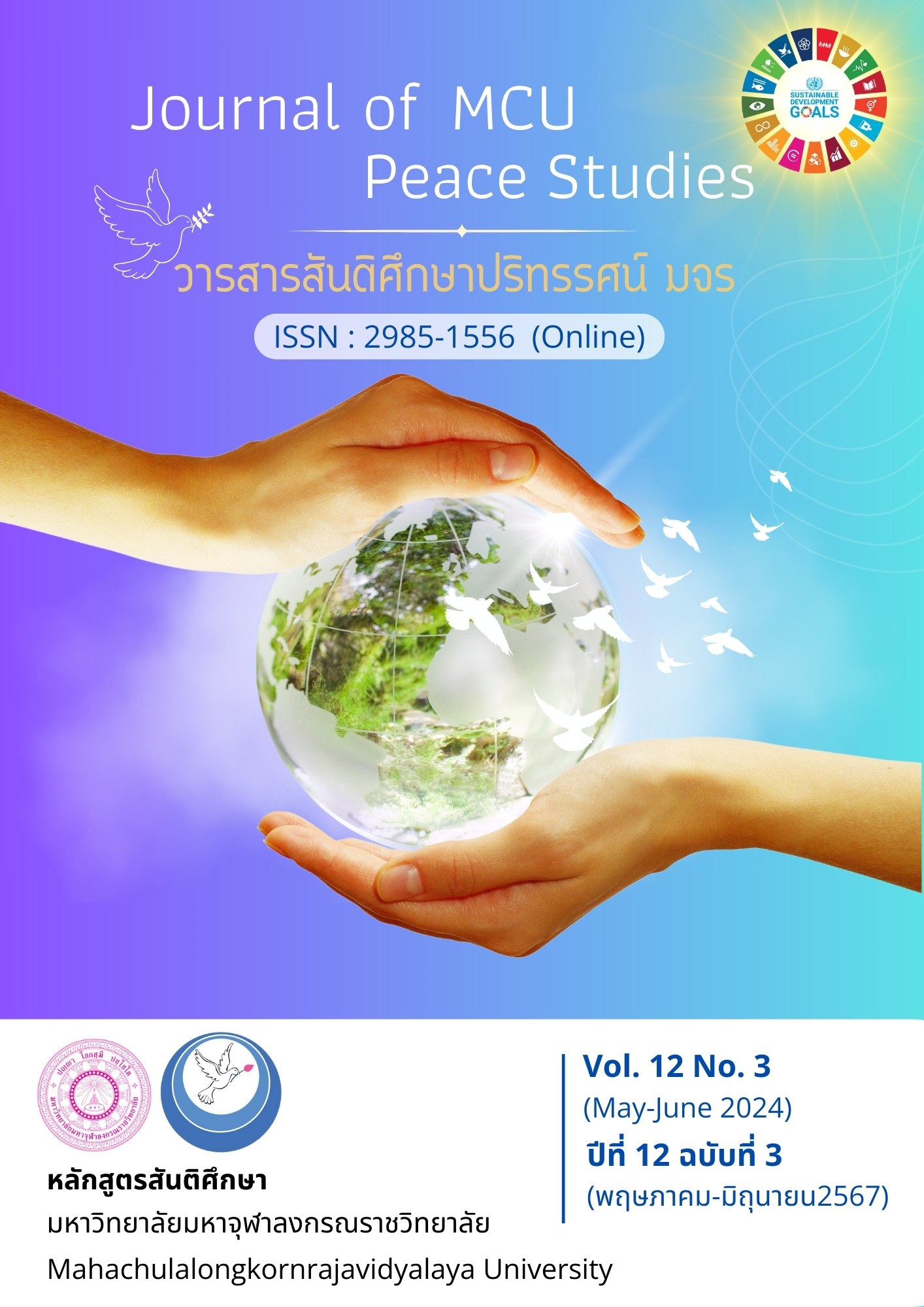การพัฒนาทักษะกระบวนการทางวิทยาศาสตร์และผลสัมฤทธิ์ทางการเรียนของนักเรียนชั้นมัธยมศึกษาปีที่ 2 เรื่อง โลกและการเปลี่ยนแปลง โดยการจัดการเรียนรู้แบบสืบเสาะหาความรู้ 5 ขั้น ร่วมกับ TPACK
Main Article Content
บทคัดย่อ
การวิจัยครั้งนี้มีความมุ่งหมายเพื่อ 1) พัฒนาแผนการจัดการเรียนรู้แบบสืบเสาะหาความรู้ 5 ขั้น ร่วมกับ TPACK เรื่อง โลกและการgปลี่ยนแปลง ของนักเรียนชั้นมัธยมศึกษาปีที่ 2 ให้มีประสิทธิภาพตามเกณฑ์ 80/80 2) เปรียบเทียบทักษะกระบวนการทางวิทยาศาสตร์ก่อนเรียนและหลังเรียน 3) เปรียบเทียบผลสัมฤทธิ์ทางการเรียนก่อนเรียนและหลังเรียน 4) ศึกษาความพึงพอใจของนักเรียนที่มีต่อการจัดการเรียนรู้แบบสืบเสาะหาความรู้ 5 ขั้น ร่วมกับ TPACK กลุ่มตัวอย่างที่ใช้ในการวิจัย คือ นักเรียนชั้นมัธยมศึกษาปีที่ 2/6 ภาคเรียนที่ 2 ปีการศึกษา 2565 โรงเรียนเรณูนครวิทยานุกูล สำนักงานเขตพื้นที่การศึกษามัธยมศึกษานครพนม จำนวน 32 คน โดยการสุ่มตัวอย่างแบบกลุ่ม เครื่องมือที่ใช้ในการวิจัย ประกอบด้วย 1) แผนการจัดการเรียนรู้แบบสืบเสาะหาความรู้ 5 ขั้น ร่วมกับ TPACK 2) แบบทดสอบวัดทักษะกระบวนการทางวิทยาศาสตร์ 3) แบบทดสอบวัดผลสัมฤทธิ์ทางการเรียน และ 4) แบบสอบถามความพึงพอใจ สถิติที่ใช้ในการวิเคราะห์ข้อมูล ได้แก่ ร้อยละ ค่าเฉลี่ย ส่วนเบี่ยงเบนมาตรฐาน และสถิติทดสอบค่าทีแบบกลุ่มที่ไม่เป็นอิสระต่อกัน
ผลการวิจัยพบว่า 1) แผนการจัดการเรียนรู้แบบสืบเสาะหาความรู้ 5 ขั้น ร่วมกับ TPACK เรื่อง โลกและการเปลี่ยนแปลง มีประสิทธิภาพเท่ากับ 81.91/81.04 ซึ่งเป็นไปตามเกณฑ์ที่กำหนดไว้ 2) ทักษะกระบวนการทางวิทยาศาสตร์ของนักเรียนหลังเรียนสูงกว่าก่อนเรียนอย่างมีนัยสําคัญทางสถิติที่ระดับ .01 3) ผลสัมฤทธิ์ทางการเรียนของนักเรียนหลังเรียนสูงกว่าก่อนเรียนอย่างมีนัยสําคัญทางสถิติที่ระดับ .01 4) ความพึงพอใจของนักเรียนต่อการจัดการเรียนรู้แบบสืบเสาะหาความรู้ 5 ขั้นร่วมกับ TPACK มีค่าเฉลี่ยเท่ากับ 4.54 ซึ่งอยู่ในระดับมากที่สุด
Article Details

อนุญาตภายใต้เงื่อนไข Creative Commons Attribution-NonCommercial-NoDerivatives 4.0 International License.
ทัศนะและความคิดเห็นที่ปรากฏในบทความในวารสาร ถือเป็นความรับผิดชอบของผู้เขียนบทความนั้น และไม่ถือเป็นทัศนะและความรับผิดชอบของกองบรรณาธิการ ยินยอมว่าบทความเป็นลิขสิทธิ์ของวารสาร
เอกสารอ้างอิง
Adulyasas, L. (2018). The Effects of Developing Pre-Service Mathematics Teachers’ Technological Pedagogical Content Knowledge (TPACK) on Mathematics Students’ Achievement. Journal of Yala Rajabhat University, 13(1), 115-128.
Bybee, R. W. (1991). Integrating the History and Nature of Science and Technology in Science and Social Studies Curriculum. Science Education, 75(1), 143-145.
Khuha, P., Panprueksa, K., Sirisawat, C., & Singlop, S. (2019). The Effects of Inquiry Learning Cycle (5Es) with Concept-Based Instruction in Photosynthesis on Biological Concepts and Science Concepts and Science Communication Abilities of the Eleventh Grade Students. Journal of Education Naresuan University, 21(4), 198-211.
Khumraksa, B., & Ruksakit, P. (2019). Improvement of Science Process Skills by Using Research-Based Instruction on Soil Properties for the 2nd Grade Students in a Municipal School, Surat Thani, J. Res. Unit Sci. Technol. Environ. Learning, 10(1), 14-29.
Koehler, M. J., & Mishra, P. (2008). Handbook of Technological Pedagogical Content Knowledgefor Educators. New York: Routledge.
Mankong, P., & Suppapittayaporn, D. (2018). Critical Thinking Ability in Science of Grade 8 Students Learned through Argument Mapping. Journal of Education Naresuan University, 20(4), 129-143.
Mishra, P., & Koehler, M. J. (2006). Technological Pedagogical Content Knowledge: A Framework for Teacher Knowledge. Teachers College Record, 108(6), 1017-1054.
Office of the Basic Education Commission. (2017). Basic Education Core Curriculum B.E. 2551 (A.D. 2008). Bangkok: Bureau of Academic Affairs and Educational Standards Office of the Basic Education Commission Ministry of Education.
pariwanta, Y., Saikraduang, A., & Jansawang, N. (2012). The Development of a Science Process Skills Test for 7th Grade Students. RMU.J. (Humanities and Social Sciences), 6(3), 117-126.
Rueangsawat, W., Srisa-ard, S., & Pilanthananond, N. (2022). TPACK for Science Learning: TPACK for Biology Learning. Journal of Educational Review Faculty of Educational in MCU, 9(1), 197-208.
Saridpaisan, N., Chaiprasert, P., & Thongsorn, P. (2019). The Effects of Learning Management Using Scientific Methods with Higher-Order Questions to Promote Learning Achievement, Integrated Science Process Skills, and Analytical Thinking Ability of 7 Grade Students. Journal of Education Naresuan University, 21(3), 113-126.
Seetham, Y., Pansupawat, A., & Suwannatrai, K. (2019). The Effect of Inquiry Cycle (5Es) and Graphic Organizer on Rocks and Crustal Deformation Topics for Prathomsuksa 6 Students. Journal of Curriculum and Instruction Sakon Nakhon Rajabhat University, 11(30), 75-83.
Srirasa, N., Chaiprasert, P., & Sirisawat, C. (2019). The Learning Achievement and Satisfaction of Upper Secondary School Students on Learning Management of Inquiry-Based Learning (5E) with an Electronic Book. Journal of Education Studies, 49(4), 1-13.
Thammaprateep, J. (2016). Developing Technological Pedagogical Content Knowledge in Science Teaching. Journal of Research and Curriculum Development, 6(2), 1-13.
Thanawathanakon, C. (2020). The Development of the Learning Process 5E Inquiry about Using Multimedia Software Word Processing Program (Microsoft Word 2013) for Grade 5. Journal of Educational Technology and Communications Faculty of Education Mahasarakham University, 3(7), 9-23.
The Institute for the Promotion of Teaching Science and Technology. (2021). PISA 2018 Assessment Results: Reading, Mathematics, and Science. Bangkok: The Institute for the Promotion of Teaching Science and Technology.
Thepbamrung, B., & Umkrai, J. (2016). A Learning Management of TPACK MODEL Using 3D Augmented Reality in Science Subject for Grade 1 Students Case Study in Bantonksadao. Journal of Project in Computer Science and Information Technology, 2(1), 29-35.
Tipsing, A., Pansupawat, T., & Phothikanith, A. (2016). Development of Analytical Thinking and Scientific Process Skills Using Learning Management on “My Body” Based on 5E Inquiry Learning Cycle Integrated with Six Thinking Hats Technique for Prathomsuksa 6 Students. Journal of Curriculum and Instruction Sakon Nakhon Rajabhat University, 8(22), 161-172.


